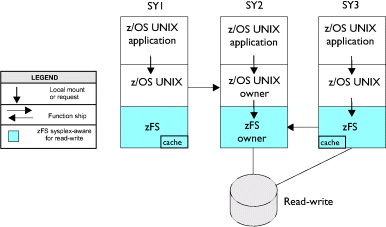When is the z/OS UNIX owner important?
The z/OS® UNIX owner is important when a zFS read/write file system is non-sysplex aware. In this case, all file requests are handled through z/OS UNIX function shipping to the z/OS UNIX owning system. The z/OS UNIX owner and the zFS owner are always the same system.
When a zFS sysplex-aware file system is mounted, z/OS UNIX causes the file system to be locally mounted on each system (where zFS is running sysplex-aware). These are called catch-up mounts. If a local catch-up mount fails (for example, because the DASD is not accessible from that system), then z/OS UNIX treats that system (such as SY1) as a client and function ships requests to the z/OS UNIX owner (SY2). The system (SY1) might issue message BPXF221I. In this case, a df -v command issued from SY1 indicates Client=Y for that file system. In turn, zFS directly accesses the file system and function ships metadata updates to the zFS owner, if the zFS owner is a different system than the z/OS UNIX owner—in this case, it is not different (for example, see Figure 1 ).
The zFS owner can be different than the z/OS UNIX owner. In this case, the request is function shipped by z/OS UNIX (from SY1) to the z/OS UNIX owner (SY2) and then is handled by direct access to the file system. Metadata updates will be function shipped by zFS to the zFS owner.
Similarly, if a local mount fails in the read-only mount case, z/OS UNIX treats that system as a client and function ships (the read) requests to the z/OS UNIX owning system. zFS does not typically function ship in the read-only case regardless of which system is the zFS owner.
